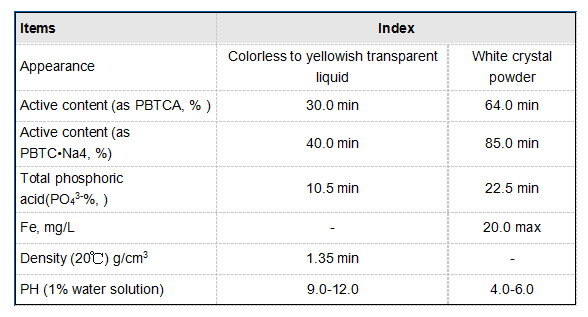limescale inhibitor
Understanding Limescale Inhibitors Importance and Functionality
Limescale build-up is a common issue faced by many households, particularly in areas with hard water. The problem arises from the precipitation of calcium carbonate and other minerals that accumulate on surfaces in contact with water, such as pipes, faucets, and heaters. This makes limescale inhibitors an essential consideration for homeowners looking to protect their plumbing systems and appliances.
Limescale inhibitors are chemical agents designed to prevent the formation and deposition of scale in water systems. They work by altering the physical and chemical properties of the minerals found in hard water, which helps to keep them suspended and prevent them from crystallizing. There are several types of limescale inhibitors, each functioning differently to control limescale build-up.
One popular class of limescale inhibitors is phosphonates
. These compounds chemically bind to calcium and magnesium ions, forming stable complexes that do not precipitate as scale. By inhibiting the crystallization process, phosphonates can effectively reduce limescale deposits in plumbing systems and appliances. Additionally, they are often used in industrial applications, such as cooling towers and boilers, to maintain efficiency and prolong equipment life.limescale inhibitor

Another method of limescale inhibition is the use of polyphosphates. These compounds serve similarly to phosphonates but through a slightly different mechanism. Polyphosphates create a protective film on surfaces, which prevents scale from adhering and forming on pipes and appliances. This not only extends the lifespan of equipment but also enhances the overall performance of water-using systems.
In recent years, more environmentally friendly and sustainable options have emerged in the market. Natural limescale inhibitors, such as citric acid and certain plant extracts, have gained popularity. These substances can modify the behavior of calcium carbonate, helping to prevent limescale formation without the potential side effects associated with synthetic chemicals. Such natural inhibitors are particularly appealing for those who prioritize eco-friendly products in their homes.
The application of limescale inhibitors is not limited to just residential settings; they are also critical in various industries, including food processing, manufacturing, and water treatment. By maintaining clean and scale-free equipment, businesses can enhance efficiency, reduce energy consumption, and lower maintenance costs.
In conclusion, limescale inhibitors play a vital role in managing the challenges posed by hard water in both household and industrial contexts. By effectively preventing scale formation, these agents contribute to the longevity of plumbing systems and appliances, reduce operational costs, and promote sustainable practices. As technology and research in this field continue to evolve, consumers can expect more innovative and environmentally friendly solutions to combat limescale. Investing in a suitable limescale inhibitor can save time, money, and resources in the long run, making them an invaluable asset in maintaining water systems.
-
2-Phosphonobutane-1,2,4-Tricarboxylic Acid: Scale & CorrosionNewsAug.29,2025
-
Premium Isothiazolinones | Broad-Spectrum Biocidal SolutionsNewsAug.28,2025
-
LK-319 Special Scale And Corrosion Inhibitor For Steel Plants: Advanced Solutions for Industrial Water SystemsNewsAug.22,2025
-
Flocculant Water Treatment: Essential Chemical Solutions for Purification ProcessesNewsAug.22,2025
-
Isothiazolinones: Versatile Microbial Control Agents for Industrial and Consumer ApplicationsNewsAug.22,2025
-
Scale Inhibitor: Key Solutions for Water System Scale PreventionNewsAug.22,2025





